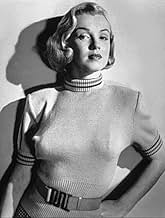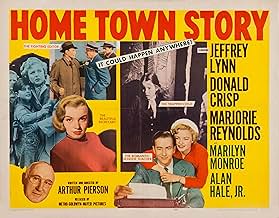Ajouter une intrigue dans votre langueAfter failing to be re-elected, politician Blake Washburn returns home and becomes editor of the local newspaper. When he notices the influence the paper has on the public, he uses it to app... Tout lireAfter failing to be re-elected, politician Blake Washburn returns home and becomes editor of the local newspaper. When he notices the influence the paper has on the public, he uses it to appeal to potential voters in the next election.After failing to be re-elected, politician Blake Washburn returns home and becomes editor of the local newspaper. When he notices the influence the paper has on the public, he uses it to appeal to potential voters in the next election.
- Katie Washburn
- (as Melinda Plowman)
- Hospital Nurse
- (uncredited)
- Jimmy
- (uncredited)
- Don
- (uncredited)
Avis en vedette
The supporting cast almost makes it worth seeing by itself. How often do you see the combination of Marilyn Monroe, Donald Crisp, and Alan Hale, Jr. in the same movie? Monroe appears in several scenes, and although only one gives her any significant screen time, she does get the chance to command some attention. Hale is well-cast as the good-natured sidekick. Crisp's talent and experience keeps the last portion of the movie from coming apart. The lively Marjorie Reynolds is also in the cast, but her character doesn't give her many opportunities to show what she can do.
The story line was overtly designed to accommodate the corporate backers of the movie, and now it is really only of interest as a look at some common perceptions of its day. The last part of the movie did have the potential for some fairly effective melodrama, but parts of it become rather labored, and it is mainly thanks to Crisp's restrained performance that it remains watchable.
Jeffery Lynn is cast as the leading character, and while he has his moments, he does not really have the range to make a routine story like this work effectively. He does not make his character very likable or interesting, and as a result his character's perspective is largely trivialized. That plus the rather routine script make it a largely unmemorable movie, aside from the curiosity factor that it offers.
Jeffrey Lynn is our star who has returned to his hometown in Hometown Story a defeated State Senator, defeated by Hugh Beaumont grandson of Donald Crisp who is the biggest employer in the area. Lynn takes over the newspaper and decides to use it to gain support for a comeback bid. And who to go after but the biggest target around.
And if you can't find an issue, create one. Lynn attacks what he labels the obscene profits of Crisp's firm and others like it. That sends Crisp into Lynn's office with a theory of capitalism and a defense of his business practices.
At first people might dismiss this film because in this day and age we now see what corporations like Enron and investment banks like Goldman-Sachs have done. But I would quote no less than Martin Sheen from Wall Street who says there is a great deal of difference between speculators like Michael Douglas and businessmen like Crisp who started the business and put their work and sweat into it.
Of course it would be interesting 60 years later to see if that Hometown Story now includes said firm moving to a foreign country or to some state with right to work laws and no environmental regulations. It's a complicated business with no easy answers.
Hometown Story would be gathering dust in a tin can at MGM's vaults if it weren't for the fact that Marilyn Monroe has a small role as a secretary at Lynn's newspaper. She's not Lynn's love interest, that's reserved for Marjorie Reynolds. But she does send Lynn's best friend and star reporter Alan Hale into a tizzy. The future skipper of the USS Minow has his hormones in overdrive.
Economics is not an easy subject for films and Hometown Story will not provide any answers. But it's pleasant enough viewing.
The movie starred Jeffrey Lynn as Blake Washburn - a one term state senator who's defeated for re-election and can't let it go. In fact he's the poster boy for sore losers, ready to pick fights with anybody who brings his defeat up, and convinced that the people were tricked into voting for his opponent. Frankly, he was a thoroughly unlikable character. Returning to his hometown, he uses his new position as editor of the family-run newspaper to criticize the man who beat him and to take on a variety of crusades, most notably against excess corporate profits. In that sense, the movie perhaps had some potential to provide a degree of social analysis, except that there was always question as to whether Washburn really cared about these issues, or whether he was simply using the paper as a platform to launch another election bid. In the end, the movie actually becomes a celebration of the system, as Washburn learns why profits are necessary, and how a company's profits benefit us all.
I found this most interesting for the very early look at Monroe, as well as for a look at a not bad piece of work from a young Alan Hale, Jr., who I know best as the Skipper from "Gilligan's Island." One thing really made me curious - how could Lynn play the brother of young Katie, played by Melinda Plowman, who got a few years as a bit player out of an acting career? Lynn would have been 42 when this was made, Plowman about 10. The family relationship was not at all believable. 4/10
Allen Hale Jr. is great as the reporter and former WWII Sea-Bee. And I love the character actress who plays the Society Reporter at the newspaper. And, of course, Marjery Reynolds had a great career on early television, shortly after this film.
But the best performance - great despite the fact that it is the vehicle to please the "anti Communist" / Black-list fear of 1951, is that of Donald Crisp: an incredible actor!!
Le saviez-vous
- AnecdotesMarilyn Monroe was often expected to provide her own wardrobe, a common practice in Hollywood at the time. The sweater with the grey body and black sleeves that she wears worn previously in The Fireball (1950) and in the final scene in Ève (1950).
- GaffesWhen Blake arrives home, his mother is listening to a radio show that states it is a Saturday afternoon program, but the next morning (which should be Sunday) Katie gets on a bus to go to school.
- Citations
Iris Martin: I always treat men with respect so they do the same to me.
Slim Haskins: Let me know when that works!
- ConnexionsFeatured in Vampira and Me (2012)
Meilleurs choix
- How long is Home Town Story?Propulsé par Alexa
Détails
- Date de sortie
- Pays d’origine
- Langue
- Aussi connu sous le nom de
- Hometown Story
- Lieux de tournage
- sociétés de production
- Consultez plus de crédits d'entreprise sur IMDbPro
- Durée1 heure 1 minute
- Couleur
- Rapport de forme
- 1.37 : 1



































